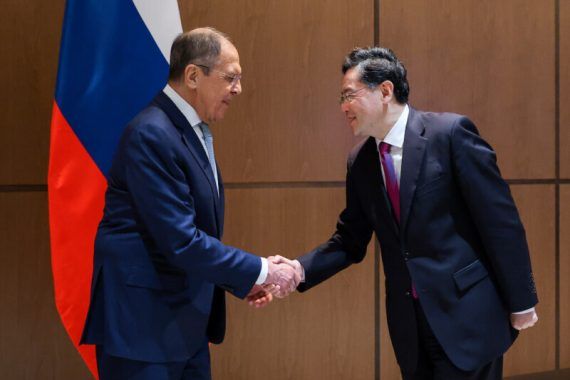After months of tergiversations, Chinese President Xi Jinping finally made a phone call to Ukrainian President Volodymyr Zelenskyy – the first time the two leaders have spoken since the outbreak of the war. Zelenskyy tweeted in praise for this meaningful move, highlighting the need for collaboration in paving the way for peace. Subsequently, China pledged to send a special envoy to lead its mediation efforts and help provide vital humanitarian aid.
The road to peace is long, gruelling, and full of obstacles, and no observer expects a single phone call to stop this conflict. However, this step represents an important signal that China is interested in peace, thus kick-starting a process that may end this devastating war.
Beijing-Moscow Ties as a Leverage?
The War in Ukraine boosted the China-Russia partnership. Beijing brought a breeze of fresh air to the sanctions-thorn Russian economy thanks to a $190 billion trade deal. Moreover, China’s diplomatic support was pivotal in insulating Russia from international condemnation in the UNSC. Beijing also dismissed parts of the joint statement at the G-20 that condemned Russia.
Nevertheless, China is the major partner in this relationship, retaining the upper hand owing to discounted energy prices and an expanding volume of Yuan in Russian markets and treasury.
Can China use its strategic advantage to pressure Moscow into ending the war in Ukraine? China has already revealed its diplomatic prowess by bringing Saudi Arabia and Iran to the negotiating table, and now it is offering to help facilitate peace talks in the Israeli-Palestinian conflict. However, the conflict in Ukraine presents a unique challenge that may require a different approach.
BRICS and Yuan
While the allure of cheap oil, the Yuan’s volume in the Gulf, and the BRICS membership can be attractive to some lower-league players, building a global reputation as a responsible superpower is another ball game. But let’s be real: China’s lifeline to Russia may give them the upper hand, but the Ukraine war is also a golden opportunity for its global stature.
Ending the conflict in Ukraine could bring an invaluable reputational gain that cannot be measured in dollars or Yuan. China would gain more from the cessation of hostilities in Ukraine than any further escalation.
Meanwhile, Beijing is playing a multi-faceted game – boosting its reputation and keeping an eye on the potential for reconstruction opportunities that could arise from a de-escalation scenario leading to peace. Rebuilding a region devastated by war is a lucrative business, and China appears poised to have its share of the pie.
Recommended
Getting the West Out of the Way
China’s actions carry a tacit warning to Washington to keep its distance. It is important to note that China’s 12-point political solution proposal to the Russia-Ukraine War, released on the first anniversary of the conflict, includes two significant points: the rejection of a Cold War mentality and the ineffectiveness of sanctions. These points are direct jabs aimed at NATO expansion and the stance of Western countries that joined the U.S. bandwagon in imposing sanctions. China is reminding the latter, particularly the U.S., that they have effectively removed themselves from the negotiation table by adopting such a posture.
French President Macron’s visit to China revealed cracks in the European standpoint, as some players were forced to fend for themselves, refusing to become mere followers of the United States, even if the latter provided the continent’s security for decades.
No one knows what game Macron is playing, and many find his goal of reaching “strategic autonomy” in Europe unrealistic. In any case, Macron’s statement that France would not interfere in the case of a Chinese invasion of Taiwan irked most U.S. and European decision-makers. While it demonstrates Europe’s unwillingness to get caught in the middle of crises, it weakens Washington’s hand, raising questions about the sustainability of sanctions on Russia and similar other containment strategies intended for China in the future.
What Can Beijing Do?
If Beijing’s resolve persists, the conflict will likely witness a peace process preceded by confidence-building measures. Xi Jinping can keep Putin’s offensive tendencies in check. There is a growing consensus that a nuclear showdown would be a lose-lose situation for all parties involved. This situation is contingent upon the Ukrainian side’s cessation of any major offensives.
Moreover, the hostility towards NATO, which unites Russia and China, means that the transatlantic alliance will not be part of a China-led peace scenario.
Furthermore, Beijing could use its leverage to limit escalation, bolster humanitarian aid, and maintain the grain corridor deal spearheaded by Turkey last year.
In international politics, progress can be slow and incremental, and the recent phone call between China and Russia is unlikely to yield immediate results. The White House will not sit idle and could push for a major spring Ukrainian offensive. Meanwhile, whether Russia will come to terms with China’s efforts to de-escalate ongoing conflicts remains to be seen. At the end of the day, as Confucius wisely said, “It does not matter how slowly you go as long as you do not stop.”





